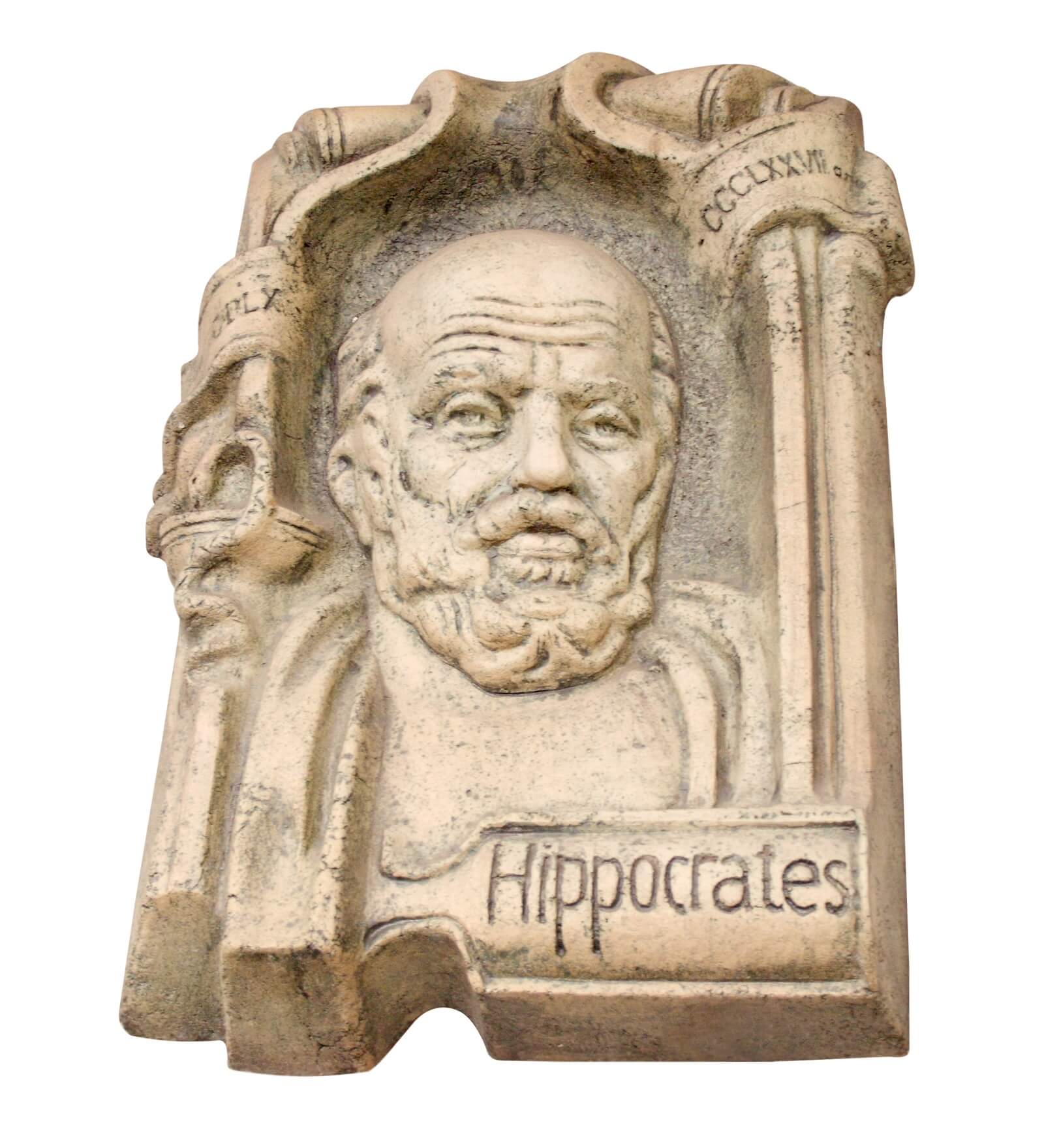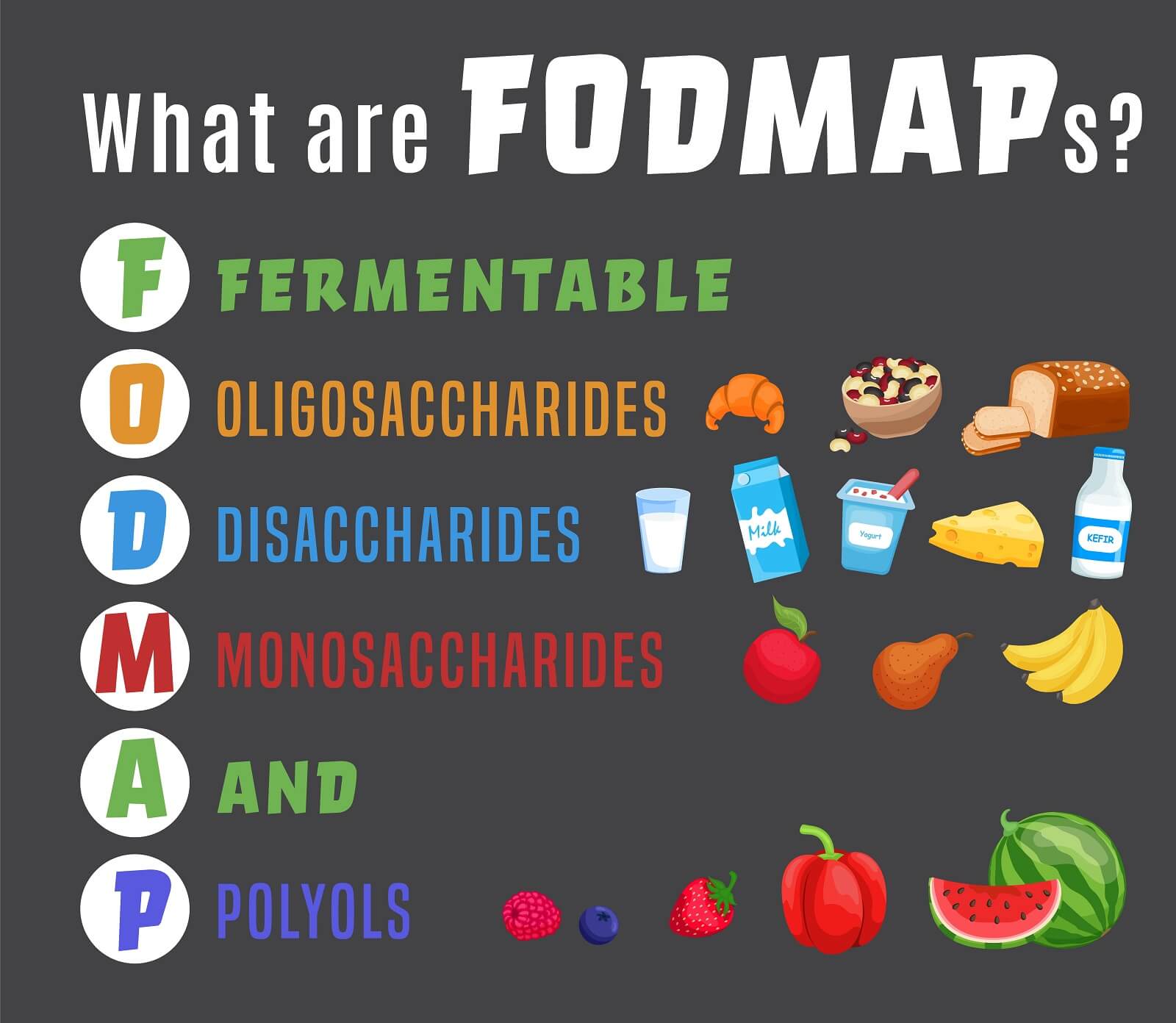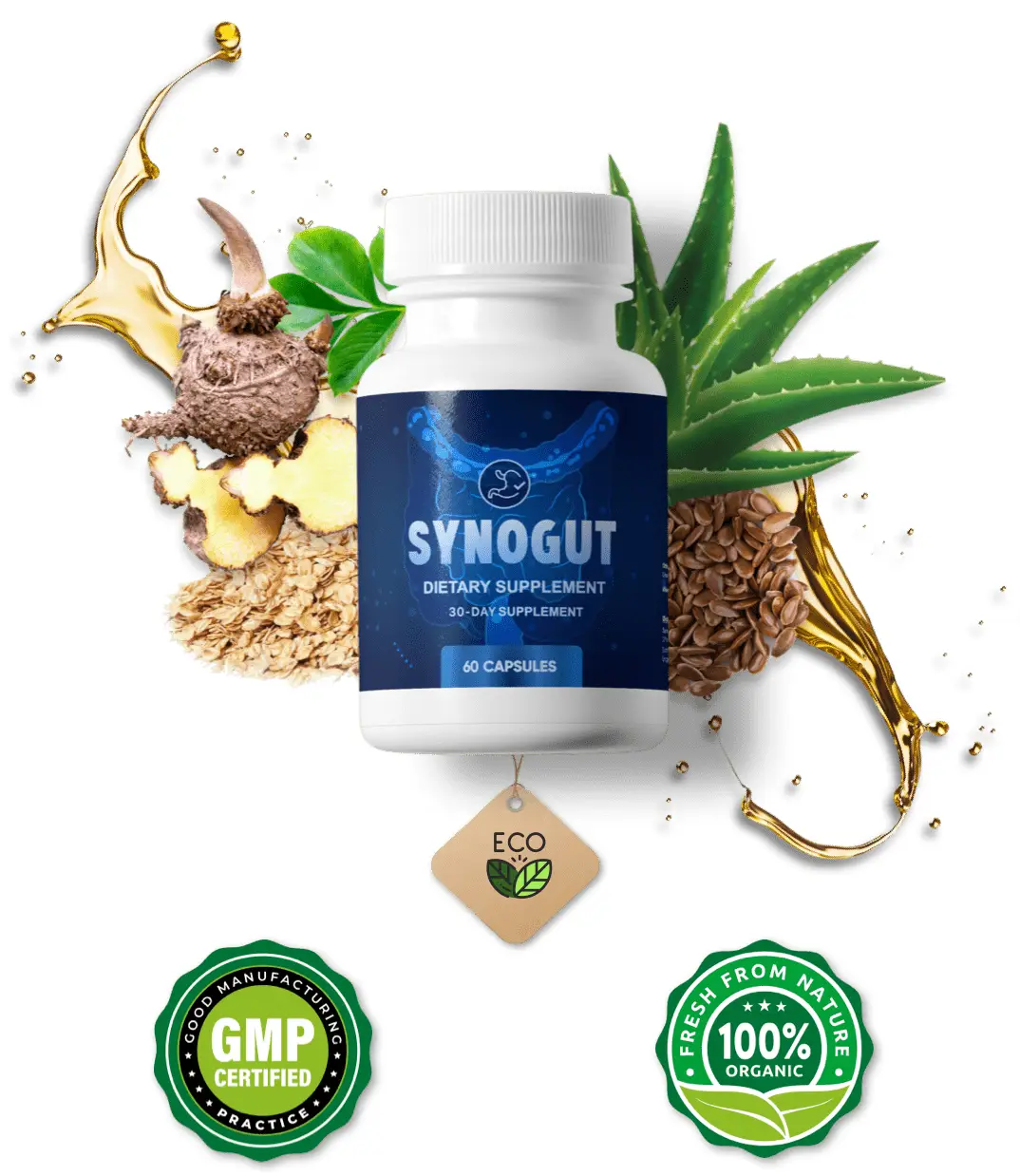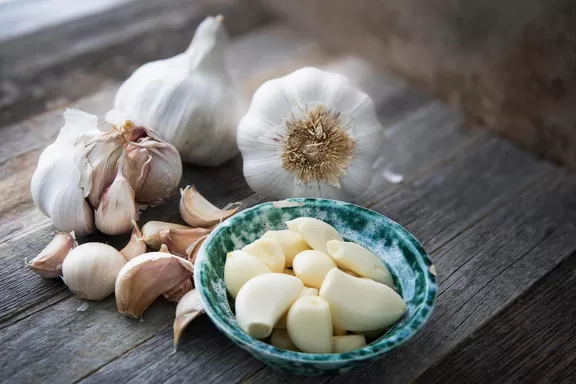
So, when choosing a garlic to use, you might want to opt for black garlic instead of the regular version. It may help with constipation even more!
Does garlic (Allium sativum) help to get rid of constipation? For humans, ancient medicinal texts say that it does work. There have been limited experiments with black garlic (heated, aged garlic that has a very dark color) on rodents. These experiments on rodents confirmed that black garlic helps the bowels to empty.
Since there is limited evidence at the time of this writing, besides anecdotal accounts, experimentation may be the only way to determine if this remedy will work for you. But, given the vast amount of historical accounts saying it works, and the positive results black garlic had on rodents, it would be worth a try.
One important caveat to consider is that garlic has high fermentable oligo-, di-, and monosaccharide and polyol (FODMAP) content. As we will discuss later, foods high in FODMAP content have been shown to aggravate irritable bowel syndrome (IBS). And, can make constipation predominant IBS worse.
Yet, it is important to remember that IBS is improved when people go through a comprehensive low FODMAP diet. In fact, milk is a high FODMAP food, and many other foods are as well. It takes a specialized eating plan to avoid these ubiquitous compounds. And, a little milk in your coffee is considered to be not as high in FODMAP as a glass of milk, so when less is consumed, the impact to a FODMAP diet is reduced.
Thus, because you would only be taking a clove of garlic, and probably are not embarking on a low FODMAP diet (which you’d want to outsource the planning to a dietician as it’s complex), it seems to be an attention grabbing detail copywriters put in when discussing this topic. FODMAP diets work, but line item exclusions of small amounts of food are probably of less importance.
And again, people on a low FODMAP diet do not stay on a strict version indefinitely. So if you are not restricted in such ways, and probably especially if you don’t have IBS, garlic is a viable consideration for constipation.
How to Use Garlic for Constipation
To give this remedy a try, it would probably be best to take a garlic clove on an empty stomach when you wake up with a big glass of water. Try waiting at least 30 minutes before you eat to let your stomach process the garlic.
You can repeat this routine for a week or so to see the results. Anecdotal evidence says that this should work! Additionally, water is going to help you pass a stool; and, if you go on a short term fast and only drink water, that should go a long way in helping you have a bowel movement.
Samuel Bart’s Digestive Health Solution
Samuel Bart has always been passionate about plants and their ability to keep us healthy. He has put together some of the best natural ways that could help anyone support a healthy digestive system.
Samuel perfected an easy, yet powerful formula, which consists of amazing ingredients. Bart’s supplement is backed by a ironclad 60-day, money back guarantee.

Research on Garlic’s Effects on Intestinal Transit
A 2018 study in Food Research International(source 1) tested black garlic extract fractions on rats to determine the effects these fractions would have on gastrointestinal function. A water fraction (WF) and a n-butanol fraction (NBF) of black garlic were tested in these experiments. A low dose of 200 mg/kg and a high dose of 400 mg/kg of WF and NBF were administered to the rats.
The study tested the gastrointestinal emptying rate using charcoal (activated carbon). The rats were fed a charcoal solution and then sacrificed. The study found that mice receiving no black garlic extract had a charcoal clearing rate of about 40%.
A low dose of WF resulted in about 47% emptying and a low dose of NBF resulted in about 54% emptying. A high dose of WF resulted in about 49% emptying and a high dose of NBF resulted in about 62% emptying.
The study also tested how WF and NBF would affect defecation time. The study found that both WF and NBF at both high and low doses reduced defecation time. The higher doses of these fractions helped the rats to poop even faster than controls (rats given no black garlic).
The study goes on to conclude as to why black garlic helps improve intestinal transit. The following quote was taken from the study:
The present study suggests that black garlic extract with n-butanol fraction can effectively promote gastrointestinal emptying by increasing 5-HT4 content, which directly affects intestinal movement.
Food Research International 107 (2018): 102-109
A 2021 review study in Molecules(source 2) discussed black garlic’s impact on human diseases. Of the studies reviewed, one was conducted on mice and the mice were given a mixed black garlic drink. The black garlic drink showed a clear laxative effect. This laxative effect also improved the bacterial life of the mice as well.
The research does also say that very few studies have looked into the laxative effects of black garlic.
Guaranteed 24 Hour Constipation Relief
Dr. Scott McLeod, PharmD received his doctorate from the WSU College of Pharmacy. His book on constipation is guaranteed to show you how to get relief in 24 hours or less-or your money back (60 day, 100% refund guarantee).
Everything used in this plan is from nature. No use of harmful laxatives. People who have used these say they work BETTER than over-the-counter laxatives!

Garlic’s Use for Constipation in Antiquity

Garlic was a very popular herb in ancient civilizations due to its medicinal applications. And, the ancients also used garlic as a treatment for constipation.
One of many references made to garlic’s historical use was in a 2001 study published in Applied Microbiology and Biotechnology.(source 3) The study states that the Romans praised the virtues of garlic. The roman naturalist Pliny wrote in his Historia Naturalis that this herb could be used for digestive system problems and a variety of other problems—including tumors and consumption.
This same study goes on to say that Hippocrates, often referred to as the "Father of Medicine," stated that garlic could be used as a laxative.
A 2010 study in Pharmacognosy Reviews(source 4) also states that the ancient Assyrians used a tea made from garlic and solid resin in order to treat constipation. This information was recorded by Ashurbanipal, the last great tsar of Assyria, amongst a 10,000 volume clay library.
A 2014 study in the Avicenna Journal of Phytomedicine(source 5) states that the Persian physician-philosopher Avicenna, in his work Al Qanoon Fil Tib (The Canon of Medicine) completed in 1025, said garlic could be used for constipation—and many other ailments.
Therefore we see that it appears garlic may have been ubiquitous, to some extent, in its application for treating constipation in historical times. No doubt there may be some credence to this natural remedy as a result! Consequently, if I were constipated, I probably wouldn’t hesitate to give garlic a try.
Naturally Treat Hemorrhoids in 48 Hours
Jessica Wright’s unique 5-step, all-natural approach to hemorrhoid treatment delivers permanent relief. Heal hemorrhoids in 48 hours, and eliminate the root cause in 30 to 60 days.
Benefit from Jessica’s 12 years of research; her book is backed by a 60 day, 100% money back guarantee.

Garlic, Low FODMAP Diets, & Constipation

Garlic is often not consumed as abundantly as other foods with high fermentable oligo-, di-, and monosaccharide and polyol (FODMAP) content. Milk, bread, and certain fruits and vegetables also have high FODMAP content. To really see the effects of FODMAP, you probably have to actually reduce your intake of many foods.
That said, it seems like a clove of garlic here and there won’t impact FODMAP intake all that much. Eliminating bread and milk from your diet would certainly make an impact. So although garlic is a high FODMAP food, the amount consumed is probably low. A 2020 study in Nutrients(source 9) even listed milk as a high FODMAP food along with garlic, but when a little is used in coffee it was considered moderate in FODMAP content.
When it comes to low FODMAP diets and constipation there is one primary problem to be aware of. That is a lack of fiber. As you probably know, getting enough fiber is important for people with constipation. But, because low FODMAP diets can be lower in fiber, this might offset the benefit it may provide to those with constipation.
Yet, a low FODMAP diet is often beneficial generally for irritable bowel syndrome (IBS); the caveat possibly being when you also make sure to get enough fiber in cases of constipation-predominant IBS.
IBS is a broad grouping of gastrointestinal problems; and, IBS patients can be divided into subgroups based upon the primary bowel problem: IBS with predominant constipation (IBS-C), IBS with predominant diarrhea (IBS-D), and IBS that presents with a mixture of diarrhea and constipation (IBS-M).(source 6)
A 2018 study in the Journal of Gastroenterology and Hepatology,(source 7) primarily dealing with IBS-D, stated that a low FODMAP diet can reduce the flow of fluid by osmosis (osmotic fluid transit) into the gut and aggravate constipation in IBS-C. Thus, the researchers hypothesized that a low FODMAP diet would be more effective for IBS-D patients than those with IBS-C. But, the authors go on to say that other research has demonstrated low FODMAP diets help with IBS-C.
A 2014 study in Gastroenterology(source 8) found that a low FODMAP diet did generally improve the symptoms of patients with IBS-C. Symptoms such as dissatisfaction with stool consistency, passage of air, pain, and bloating were all improved in patients with IBS-C and IBS-D. Yet, it appears patients with IBS-D were helped more by the dietary intervention than IBS-C patients.
A 2020 study in Nutrients(source 9) tested a low FODMAP diet on 120 patients (48 were men, 72 were women) for six weeks. Concerning constipation frequency, a score was given with 0 = never; 1 = less than 1 occurrence per week; 2 = less than 3 occurrences per week; 3 = more than 3 times per week; 4 = daily.
Patients at the start evaluated their constipation frequency between 0.71 and 3.49. After the intervention of the six week diet, frequency scores were given between 0.31 and 1.19.
Concerning severity, low scores indicated less severe symptoms and high scores more severe. The scores were quantified as 0 = no symptoms; 1 = mild; 2 = moderate; 3 = severe.
At the beginning patients stated their symptoms severity between 0.693 and 2.773. At the end of the six week intervention severity scores were given between 0.31 and 1.19.
Thus, the evidence shows that foods with a high FODMAP content can aggravate constipation. And, avoiding them can help to reduce symptoms. Of course, low FODMAP diets don’t just eliminate garlic, they drastically alter how someone eats!
Dr. John Herzog (MD)
Dr. John Herzog, a "survival surgeon" from Maine explains what home remedies work best in a crisis situation.
This may be important in the event you require first-aid or are in an emergency situation without easy access to a hospital. Dr. John Herzog has assembled a large collection of home remedies for such scenarios.

Garlic’s Side Effects & Contraindications
There are some cautions you should be aware of when it comes to taking garlic. Fortunately, Herbsey has an article that provides a detailed summary of these side effects. You can read it (maybe just the short summary if you don’t have time!) here: Side Effects of Taking Garlic.
Generally you do not have to worry too much when taking a few cloves of garlic a day. The most common, and likely side effect, is having bad breath or bad body odor. But, if you use it on your skin, you should dilute the garlic, or use it with caution. This is because garlic can cause chemical burns.
Additionally, garlic may interact with blood thinners and drugs used to treat HIV. Also, garlic may prolong bleeding time and should be avoided before surgery. Again, the article has a more comprehensive explanation.
Claire Goodall’s Amazing Guide
Clair Goodall is a bee-obsessed, natural medicine convert from Minnesota (USA). And, she does keep bees!
Clair has created 350+ page book documenting how to replace the toxic products and medications in your home with healthier, all-natural alternatives.

A Natural Digestive System Supplement that Helps

If you have been struggling with digestive problems like constipation, you should know about Samuel Bart. Mr. Bart lives with his wife, Alma, in Nashville, Tennessee.
Mr. Bart has always had a passion for plants and how to use them medicinally. He went on to research some of the most effective ways that could help people support a healthy digestive system.
To this end, Mr. Bart developed a product he calls “SynoGut.”
Every capsule of this supplement is made in the USA, in a FDA approved, and GMP certified, facility under sterile, strict, and precise standards. Synogut capsules are non-GMO. You can rest assured that they do not contain any dangerous stimulants or toxins, and more importantly, they are not habit forming.
His proprietary blend blend contains the following ingredients:
- Psyllium husk
- Bentonite clay
- Black walnut hull
- Oat bran
- Flaxseed
- Prune fruit
- Aloe vera leaf
- Lactobacillus acidophilus (a probiotic bacteria)
- Apple fruit pectin
- Glucomannan root
If this is not the first time you have had constipation, you might benefit from the power these natural items can provide. And, if you have had prolonged constipation, utilizing a supplement like Mr. Bart’s could help you become more regular—without an arsenal of prescription drugs.
Many people have tried synthetic drugs to solve their constipation issues; and if these didn’t work, it may be hard to invest in a natural remedy like SynoGut. To this end, Mr. Bart offers a 60 day, full refund guarantee on his supplement.
If you decide to invest in Mr. Bart’s supplement, and are not satisfied with the results, you can quickly request a refund. SynoGut will promptly refund your purchase; ensuring there is no risk to give Mr. Bart a chance.
SynoGut is sold via the large online retailer ClickBank—a company based in Boise Idaho, USA. ClickBank sells products across the world, and ensures you can get a refund if you are not satisfied with SynoGut’s results.
If you are in a situation where you have “tried everything,” SynoGut is worth the quick purchase and a solid test drive. If you would like to learn more about Samuel Bart’s SynoGut supplement, you can do so at the SynoGut website.
About the Author
Nick Gross is a natural medicine enthusiast who has been researching and writing about natural medicine since 2008. Nick is primarily a web developer, but also researches and authors written and video content about natural health. Nick has a bachelor’s degree in Management Information Systems from the University of Northern Iowa.
More on Nick GrossImportant Disclosures & Disclaimers
It is important to use the information you find on Herbsey.com in the right way. Also for legal reasons, these disclaimers and disclosures are necessary. For further information about each, feel free to click the link provided to the page on this website that provides more information.
Medical Disclaimer
The information on this website is not a prescription for anyone. This information is for informational or educational purposes only, and is not a substitute for professional medical advice or consultations with healthcare professionals.
Advertisement Disclosure
Some of the links provided on this article and website are affiliate links. If you purchase a product after clicking on these links, Herbsey.com will earn a commission. Herbsey.com promotes various products through advertisement and text links. For more information: Our Advertisements.











